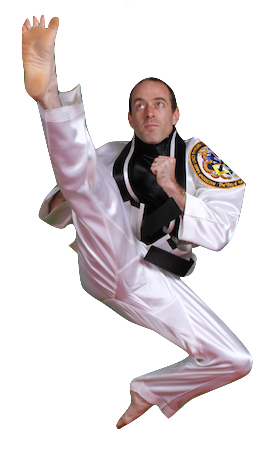
Honor
Two days before test for my first degree black belt, my instructor asked one of the other black belts to take a look at my form. I was twelve years old, and the black belt was probably in his early twenties. After watching my form, he gave me some suggestions. Then he said, “Between now and testing, I want you to do your form fifty times. If you don’t, then you’ll get 100 pushups.”
I dutifully complied. During lunch recess the next day, I found some space on the playground and did my form. In the evening at the dojahng, I went through it a dozen or more times before and after class. At home that night before bed, I cleared some living room furniture and practiced some more.
When I arrived at the dojahng on the day of the testing, the young black belt approached me. “Did you do it fifty times?” he asked. “Yes, sir,” I said proudly. It was only then that I realized he had no way of verifying my claim. I could have played hacky sack during lunch recess, squandered the time at the dojahng before and after class, and gone to sleep that night without doing a single kick.
If I had done all that, I could still have answered, “Yes, sir,” when he asked if I had completed the assignment. But I would not have felt the same pride. And my performance during the testing would not have been as good. As elementary school teachers so often say, I would only have cheated myself.
When the black belt gave me that assignment, what motivated me was the threat of 100 pushups. I assumed that if I failed to comply, he somehow would know. Of course, he would know only if I told him. So, when he took me at my word, I realized that he had trusted me all along to be honest. I had thought he only was teaching me to improve my form. But it turns out he also was teaching me about honor.
Do the Right Thing Even When No One is Looking
Honorable behavior requires integrity. I define integrity as “doing the right thing even when no one is looking.” Most universities, for example, forbid cheating but do little to police compliance with that rule. They rely instead on an “honor policy,” trusting students to do behave honestly. And because honor is such a valued trait, colleges harshly punish violations of the honor policy. When I was at Harvard, I knew of students who were expelled for minor acts of plagiarism.
We all like to see ourselves as honorable people, but we do not always resist the temptation to cut corners. When I was a teenager and still an inexperienced driver, I once nicked the side door of a parked car while trying to squeeze my parents’ truck into a tight parking space. Embarrassed by my mistake and eager to avoid being noticed, I quickly reversed and left the lot, without leaving a note on the damaged car. The tinge of humiliation I felt then at the thought of being seen struggling to park is nothing compared to the shame I still feel at my dishonorable departure.
Small tests of our integrity arise all of the time. A friend once told me excitedly that an ATM machine had mistakenly given him an extra $20 with his withdrawal. He had welcomed the good luck and had not gone into the bank to return the money. It may not be obvious to you that this was wrong. But my friend was an experienced criminal lawyer. He knew that when you find lost property and can identify the owner, failure to return it constitutes theft.
Would he have kept the money if it had been handed to him by the bank teller instead of dispensed by a machine? You probably have had the experience of buying something from a store and noticing the cashier giving you too much change. And you may have quickly debated whether to point out the cashier’s error. When I was younger, I would rationalize the theft of the undeserved change: “No one will ever notice,” I would think. “It’s a big chain store. And I’m not the one making the mistake, I’m just benefitting from it.”
But what if the transaction were less impersonal? Imagine selling something to a close friend. If your friend accidentally paid you more than the agreed-upon price, surely you would not pocket the windfall.
Once you begin concocting justifications for behavior you know to be wrong, you put your honor up for sale. And the higher the price, the more of your honor you are willing to sacrifice. For example, when I was a public defender, one of my colleagues had a trial in front of a new judge. It was clear from discussions in chambers that the judge assumed that my colleague’s client was guilty.
Of course, judges are not advocates. They are expected to be impartial when they make evidentiary rulings at trial. They are like umpires, calling balls and strikes. Whatever their background, they are required to put their sympathies aside and resist the temptation to put a finger on one side of the scale.
My colleague presented a convincing defense. The prosecution’s evidence was weak and left plenty of room for reasonable doubt. But after the jury had deliberated for a few hours, a legal issue arose that caused the judge to declare a mistrial. He discharged the jury and set a date for a new trial.
Had it not been for the judge’s clerk, this would have been the end of things. Mistrials are not unusual. No one would have suspected anything was amiss. The prosecutor would have had another chance to try to convict the defendant, in front of a different jury.
But the clerk knew something that no one else except the judge knew. Before he declared a mistrial, the judge had received a verdict slip from the jury. He had looked at it and seen that the jury had found the defendant not guilty. Normally, a verdict of not guilty ends the proceedings. The Constitution’s double jeopardy rule prohibits the state from re-trying someone who has been acquitted. But the judge had bypassed that rule. He had concealed the jury’s verdict and found a reason cut the proceedings short before the verdict was an official part of the record.
The judge’s behavior offended the clerk’s sense of honor. She called my colleague and informed him what had happened. But a more compliant clerk might not have done so. And my colleague’s client, having been acquitted by a jury, would have faced a new trial and the new threat of incarceration.
That judge sacrificed his reputation because he wanted to see the prosecution win. And he probably rationalized that sacrifice by convincing himself that the defendant was guilty, so cutting corners to ensure a conviction would serve the larger cause of justice. Of course, if he had known that his clerk had more integrity than he did, he might not have taken the risk. He did the wrong thing because he thought no one was looking.
Be Worthy of the Faith Others Have in You
When I teach my students about honor, I sometimes define it as “being worthy of the faith that others have in you.” In most cases, people give you the benefit of the doubt: They assume you are honest until you lie. They assume you are trustworthy until you cheat. They assume you are reliable until you miss a deadline. Honor is a simple matter of living up to their expectations.
In theory, this is both obvious and easy. Behaving with honor means doing what you say you will do, when you say you will do it. But in practice, we often fall short. We promise to return phone calls and don’t get around to it. We arrange to meet our friends for dinner and don’t manage to arrive on time. Usually, these small lapses are quickly forgiven.
But when they become a pattern they cease to be small. They begin to express something fundamental about us. The accumulation of inconsiderate acts is often a reflection of our priorities and insecurities.
My wife takes yoga classes at our gym. As you might expect, the classes often consist of more than mere physical routines. The instructors discuss yogic principles while they teach, offering spiritual as well as physical guidance. One of the former instructors had a habit of either arriving late or not showing up at all. When she came in late, she offered no apology. When she skipped class altogether, she did not phone the gym to notify the students.
Her behavior appalled me, and not just because it violated the terms of a financial transaction: We pay for our memberships; you teach your class. More disturbing was her expectation that the students would respect her spiritual instruction, when she had so little respect for her obligations to them. She taught as if she had attained an advanced state of awareness or enlightenment that she could transmit to her students. But she acted with little regard for others. She sought honor but did not earn it. And she clearly conveyed to her students that their time was worth less than hers.
The yoga teacher probably didn’t mean to send this message. But our behavior can be more revealing than our words. For a long time, one of my friends took a strangely cavalier approach to her commitments. At work, she was supremely competent and highly organized. But she consistently arrived late for dinner. When I invited her to social events, she enthusiastically accepted but frequently cancelled at the last minute. She spoke often of her desire to leave her white-collar job and become a writer. But when my wife helped her land a writing assignment at an award-winning magazine, she allowed the deadline to pass without completing the article.
If honor means validating people’s belief in you, my friend’s behavior was strangely dishonorable. And it was hard to square with her obvious professionalism at work and the fact that in most respects she was an unusually considerate friend. She began to recognize that there was something preventing her from fulfilling her obligations. She did not cancel at the last minute because something better had come up. She did it because she thought it didn’t really matter to me if she came along. She did not miss the writing deadline because she was irresponsible. She missed it because she was afraid of writing -- afraid to pursue her passion because she might not succeed. When she realized this, she was able to enroll in a writing class and to ask the magazine editor for another chance.
Honor, then, ultimately requires us to examine our subconscious. When we understand the impulses that drive our behavior, we can overcome them. For several years after college, a close childhood friend virtually disappeared from my life. We were living on opposite coasts, so maintaining contact required mutual effort. When we did speak, he seemed glad to hear from me, and we enjoyed catching up. But he never emailed or called me, and he rarely answered the phone when I called him. Even when I left a voicemail message on his birthday, he did not reply. He was working as a computer programmer, so I knew he checked his email frequently throughout the day. But he responded to my messages only infrequently at best.
Eventually, I sent him a gentle email message. I wrote that although I valued our friendship, I saw little reason to continue expending energy on it. Within minutes, his apologetic reply arrived in my inbox. He explained that he had been feeling depressed for a long time. He assumed that others shared his low opinion of himself, so it did not occur to him that anyone actually wanted to hear from him or cared if he returned their calls.
In the years since then, our friendship has become stronger than ever. I attribute this partly to the fact that we now live in the same city. But the more important factor was his insight into the underlying psychological basis for his behavior. That self-awareness enabled him to change. He is now much happier, and an extremely considerate friend.
What does this have to do with honor? Honor requires a constant awareness of our true feelings, so that we can align our conduct with our speech. It requires us to know what we mean so that we can mean what we say.
Match Your Words With Your Actions
One of my teenage students recently approached me after class. “My last report card wasn’t very good,” he said. The student was in my Leadership Program. Despite a shy temperament, he enjoyed assisting me during the children’s classes. He was interested in a career as a martial arts instructor. I had told him that if he went to the local community college, I would help him open a Taekwondo club on campus. But first he had to make it through high school.
“How bad was it?” I asked.
“About as bad as possible.”
We sat down in my office. This was not our first conversation about his poor academic performance. I knew he was smart enough to do better. At the dojahng, he was engaged and curious. He asked insightful questions. When we were planning a fundraiser for my nonprofit organization, he offered inspired suggestions.
“How much does school matter to you?” I asked.
“It matters,” he said. “But I’m too stressed out by things at home.”
I told him I didn’t believe him. He was capable of doing better.
“Taekwondo matters to you,” I said. “And you do great here. You work hard, you practice outside of class. You don’t let the problems with your brothers and sisters interfere with your performance here. You’re using those problems as an excuse for your low grades.”
He paused for a moment and then said, “I guess you’re right. I guess it doesn’t matter that much.”
My point was that his actions said more than his words did about how he felt. And in order to change his behavior, he first had to become aware of his feelings. Of course, acknowledging that school was unimportant to him was not enough. He needed to change his mind about the value of education.
I appealed to his sense of honor on two levels. First, I suggested that by failing his classes he dishonored me. “You don’t stop being my student when you leave this building,” I said. “Wherever you are, your behavior reflects on me and this dojahng. Being a martial artist is more than kicking and punching. It’s setting a good example in your daily life.”
Second, I warned him that his own students would not honor him if he failed to match his words with his actions. “We talk a lot about education in class,” I reminded him. “We give the children rewards for doing well in school. When you have your own dojahng and you tell your child students to work hard in school, how can you expect them to take you seriously if you didn’t bother to earn a high school diploma?”
Like my student, we do not always notice the gap between our words and our actions. On Earth Day not long ago, my wife and I took a walk in San Francisco’s Golden Gate Park. It seemed the perfect way to show our appreciation for the environment. The garden in front of the Conservatory of Flowers was lush and vibrant. The spring rains had stopped, leaving behind verdant meadows and a clear blue sky.
A crowd had gathered in the distance to commemorate Earth Day. We could see people picnicking, throwing Frisbees, playing drums and dancing. But as we drew nearer, we saw something else: Trash, everywhere. Beer cans littered the lawn. Plastic bags drifted at ankle height before becoming entangled in the bushes. McDonald’s hamburger wrappers and cigarette butts covered the ground.
The assembled revelers surely considered themselves environmentalists. By showing up for the Earth Day festivities, they intended to make a statement about their values. But it was impossible to ignore the chasm between their apparent self-image and their disregard for the planet they had gathered to celebrate. On a day meant to honor the earth, they had trashed it. And they seemed completely unaware of the irony.
Honor, then, starts with awareness. To do the right thing when no one is looking, we need to understand what is the right thing to do. We also need to recognize the price we pay when we act without integrity. To be worthy of the faith others have in us, we must be alert to the subconscious tensions and insecurities that shape our actions. And to match our words with our actions, we must be conscious not only of what we say and do, but also of how we feel.


